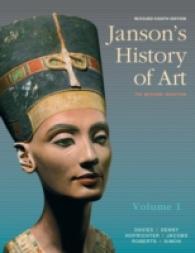- ホーム
- > 洋書
- > 英文書
- > Politics / International Relations
基本説明
What causes states to politically unify voluntarily?
Full Description
Ever since the birth of the modern nation-state at the Peace of Westphalia, the essential lodestars for governments have been sovereignty (including of a monopoly over the use of force) and territorial integrity. Given how elemental sovereignty and territorial integrity are to states, why would a government ever willingly disintegrate or give up its sovereignty to unite with another state as the junior partner?
Despite such a considerable intellectual barrier, modern history features many examples of states that have either broken apart voluntarily or merged into others. In Unifying States, international relations scholar Joseph Parent focuses on the latter phenomenon: voluntary unions. As he stresses, they occur rarely, but they do in fact happen. Indeed, the most famous example is the United States itself, in the Articles of Confederation era. Neither constructivists nor liberals, both of whom stress the positive benefits of economic convergence, can explain why union occurs so rarely. Nor can realists--who hold that in an anarchic world order, states must prize their autonomy above all else--explain why states enter into larger unions that erode their sovereignty. Parent begins from a realist perspective, yet realizes that traditional realist theory cannot account for this very real phenomenon. Instead, he contends that voluntary unions can--and do--occur in extreme circumstances. When states are painted into the same corner by events, they can balance against a threatening power by uniting with each other. Parent applies his thesis to a series of important historical cases--passage of the US Constitution, Swiss unification, the semi-merger of Sweden and Norway, and Bolivar's failed attempt to unite 'Gran Colombia'--before examining the grandest unification effort ever, the European Union. After explaining how this happened, Parent utilizes his theory to show the limits that the EU now faces as it struggles to extend the scope of unification. In sum, Uniting States is an authoritative account of a historical phenomenon that scholars have been unable to adequately explain via the main schools of international relations thought.
Contents
1. Introduction ; 2. Explaining Political Union ; 3. Force, Fraud, and the Founding of the American Constitution ; 4. America's necessity ; 5. Switzerland, Staatenbund to Bundesstaat ; 6. The Liminal Union of Sweden and Norway ; 7. Bolivar's Dreams of Gran Colombia ; 8. Europe's American Idol ; 9. Conclusion ; Appendix: Machiavelli and the Missing Romulus








